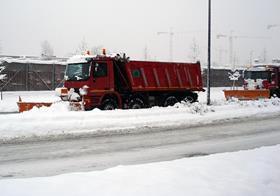
Major snowfall and extremely low temperatures across Europe have caused headaches for a number of operators in the European fresh produce sector over the past few days, with the shipment of goods disrupted by blocked roads, delays to rail services and airport closures.
In Italy, a number of airports in the north of the country were forced to close as a result of unusually heavy snowfall, with rail and road transport also disrupted.
Roads between the port city of Genoa and the region of Piedmont, vital conduits for kiwifruit and apples at this time of year, were reportedly shut off as a result of the snow, and the situation appeared particularly bleak in the northern regions of Piedmont, Lombardy and Liguria, where, according to farming organisation CIA, a number of roads leading to farms were blocked and suppliers isolated as a result.
Traders in the north of Italy confirmed that exports of kiwifruit and apples from the north-west of the country, in full swing since late last year, had been delayed as a result of the poor conditions.
'It's been snowing like crazy for days, with the main problem being the worsening condition of the roads, which means vehicles over seven tonnes cannot move,' said Silvio Ermini of Vanguard International, based in Genoa. 'The ports are closed as well, and no-one is able to load and ship goods.'
Citrus imports from Spain, Egypt and Morocco into north-western Italy, as well as imports from China, Chile, Peru, South Africa and the US, were also understood to be affected.
The CIA also reported the freezing consitions had caused problems for farmers in a number of sectors, particularly for open-field production such as vegetables.
'Damage has already been noted in a number of areas where open-field production of courgettes, salads, cabbage, cauliflower, chicory and radicchio have been destroyed,' a spokesperson for the CIA said.
Problems with logistics were also reported in Germany, Holland and Belgium, mainly as a result of late deliveries due to accidents on roads. Towards the end of the week, however, such difficulties were reportedly starting to ease.
According to German trade publication Fruchthandel, temperatures as low as –15°C caused damage to leeks and Brussels sprouts, pushing prices up as a result.
Shortages of cabbage and leeks have also been reported in Germany as a result of the cold weather.
Meanwhile, Rafal Szelezniak of leading Polish fruit and vegetable marketer Silvi Cola said that the unusually low temperatures over the past week had caused some logistical problems, particularly in loading and reloading areas.
Temperatures in the apple-growing region of Grójec dropped as low as –25°C earlier this week, although by Wednesday 7 January they had risen to –6°C.
The weather also affected Polish leek production, some of which had been left in the field to be harvested at a later stage. Many growers who had not already picked their crop have lost it as a result of the freezing temperatures, Mr Szelezniak added.
Silver linings
But for some producers, the heavy snowfall has been a positive develoment.
The CIA itself pointed out that the snow would serve to replenish Italian reservoirs and reduce the risk of drought later in the year, an important development for summer fruit suppliers.
According to Dominik Wozniak of Polish fresh produce cooperative Rajpol, the conditions have had a big impact on sales to the supermarket sector.
With most traditional street markets currently closed because of the weather, Mr Wozniak said Rajpol’s sales to its retail clients had doubled.
In Germany too, Lutz Krasemann of Cologne-based importer Fruchthansa said sales at street markets were particularly slow, with consumers preferring to shop in the relative warmth of a supermarket.
'The markets are still open, but with fewer stands and with very few visitors and fewer sales,' he explained.
Sales of stonefruit and berries were reported to be down in Germany, with consumers switching to items including citrus.
In France, Marc Peyres of apple and kiwifruit exporter Blue Whale said the chilly weather had not created many major difficulties for the fresh produce industry, although he reported some transport problems had caused delays to deliveries over the past 48 hours.
But he added that the low temperatures had in fact been beneficial to the company’s apple orchards during their current dormant phase of production.
In Slovenia, where temperatures were expected to be below zero for the coming few days at least, there we no reported delays to shipments through the Port of Koper. 'So far we have not experienced any problems,' said Milena Slobko-Jerman of port operator Luka Koper. 'Deliveries from Israel are still coming through regularly. It is very cold here, but there have been no blockages to roads.'
Additional reporting by Tom Joyce and Steven Maxwell



